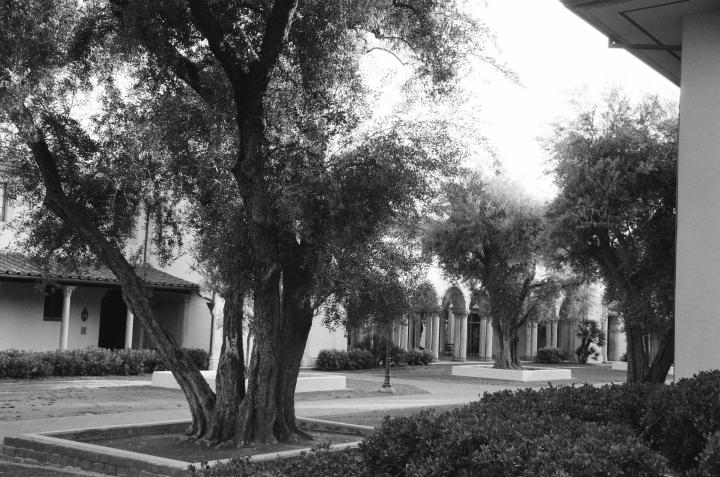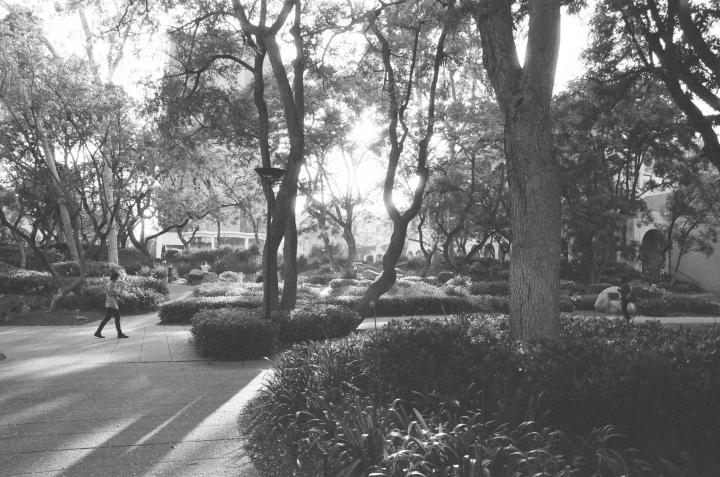Testimonials
Testimonials from past students who have participated in a global exchange.
André Rocha (Mathematics MMath (Hons), University of California, 2021-2022)
My exchange took place at the University of California, Berkeley. I went abroad during the 2021/2022 academic year, where some restrictions from the pandemic were still in place (luckily pretty much all teaching was in-person, although we were required to wear face coverings until the middle of the second semester).
The academic system at this university is quite distinct from what I was used to at Edinburgh. At Berkeley, each semester lasts around 14 weeks, which means that classes have more content to cover than in Edinburgh. Most of the classes in the Mathematics department which I took did not have any form of lecture notes or recordings available. As a result, attendance, cooperation with my colleagues, to share our notes, and attendance of office hours were quite important. There is a great emphasis on continuous assessment, with weekly hand-ins and midterms accounting for the majority of the weight in the assessment. Consequently, the workload is higher than in Edinburgh. There are also final exams by the semesters and the exam diets start one week after the end of instruction in each semester. Since there is not much time to revise before exams, commitment and organization throughout both semester are crucial to achieve success. In terms of courses, there is more variety than in Edinburgh and there is also great flexibility from the department. Provided that the student meets the prerequisites, there are no barriers to taking graduate classes or asking professors to take reading courses on their research. In my case, I took an advanced reading course on dispersive partial differential equations.
Outside academics, there are many opportunities to join student clubs, attend college sports games, or a 45-minute journey by bus to San Francisco, with many museums and parks to explore. The mainly dry and sunny weather in Berkeley also proportionates great hiking experiences. The Winter break is an opportunity to travel with friends and visit other cities and natural landmarks in California, or even the rest of the US.
I found the cost of live in Berkeley to be considerably higher than in Edinburgh (in fact, the Bay Area is one of the most expensive areas in the US to live in). University accommodation is not guaranteed to exchange students at UC Berkeley, so it is quite important to plan in advance the year abroad and budget appropriately. I ended up renting privately an apartment with another student who was completing a Masters during that academic year.
The main takeaways from my student exchange were the learning opportunities and most importantly the people I met. I took classes from some of the best mathematicians in the world, including Fields medalists and got to learn more about their research. On a personal level, I also made truly international friendships with brilliant-minded students with whom I had the chance to explore the US and make everlasting memories.
If you are looking for an academically intense experience, alongside a completely different culture and a charming campus, then UC Berkeley is the right place for you.
Alex Andrews (Mathematics MMath (Hons), University of Virginia, 2019-2020)
I spent my third year of university studying at the University of Virginia in the city of Charlottesville. Compared to Edinburgh, Charlottesville is much more of a university town with most students living near and around the campus. I lived in Lambeth Field halls, which was a really fun place to be and had a sports field right behind it where people would often play impromptu (real) football. However, an important part of on-campus accommodation at Virginia was having a roommate, which is almost a rite of passage in the US. I was quite apprehensive about this before I went but you do get used to it quite quickly. I really got on with my roommate and so did most people I know but if you’re intent on having your own space, I do know people who found private apartments in student Facebook groups so that’s always an option. A cool thing about Virginia was that you could use the buses as well as any of the multiple university gyms for free. I’m quite a sporty person but one difference between Virginia and Edinburgh was that sports societies were mostly reserved for high-level competition and intramural sport is what you would do if you didn’t make it into a society’s first team. I don’t think this was necessarily worse though because I found there was a greater number of intramural sports available.
As a skier Virginia was ideal. There were so many opportunities to ski through the university ski and snowboard team who went to the local wintergreen resort every week. I was also able to do weekly competitions throughout Virginia, North Carolina and Tennessee as well as volunteer in the local adaptive skiing programme.
Academically when I was at Virginia everything was much less centralised in comparison with Edinburgh. By this, I mean everything about a class was pretty much solely determined by the professor taking the class with course structures and standards very different across classes. This also translated into the assessment of courses which all had fairly non-standardised exams that were solely drawn up by the professor. I think this also led to more of a culture of trying to impress the lecturer and stand out amongst your peers than is the case at Edinburgh because they were more personally in charge of your grade. It was also the case that not very many resources were put online and in quite a few instances if you missed class you would have to ask the professor directly about what to catch up on. However, I was in my second semester at Virginia the year that covid started and so I think it’s quite likely that since then, the pandemic will have forced the university to be more online friendly.
Håvard Damm-Johnsen (Mathematics BSc (Hons), Caltech, 2018-2019)
My year abroad was spent at the scenic campus of the California Institute of Technology (or Caltech) in Pasadena, about half an hour by car from downtown LA. Despite being so close, I only managed to visit downtown LA three or four times over the course of my nine months in CA. At Caltech, you're really expected to spent most of your spare time studying, and the breaks between terms - Caltech has three, one before Christmas and two after - are short. While there is a lot of academic pressure, you also have the freedom to choose among a much wider range of courses than in Edinburgh; in particular there's no real distinction between undergrad and graduate courses, so assuming you have the prerequisites down, you can choose pretty much what you want. I did quite a few advanced courses in analysis, such as several variable complex analysis, analytic number theory and potential theory. Before I applied to go abroad, I read that a great advantage of going abroad is having access to a lot of interesting courses not offered in Edinburgh. This is definitely the case with Caltech. There is also a really vibrant research community in maths, with great opportunities for undergraduates to do research. The grad students were also really friendly and approachable. The house system at Caltech is really cool, and merits mentioning: there are eight houses which are supposedly modelled after Oxbridge colleges, but with 50-100 members each. They are a great way of getting to know people. I joined Dabney House, and had a great time there, meeting plenty of nice people and going to quite a few fun house events. One of the biggest changes from Edinburgh (apart from the weather, which is objectively so much better in CA) was that students were more or less expected to collaborate on problem sets. I have plenty of fond memories of staying up all night with friends finishing our differential topology homework in Dabney before handing it in at Linde Hall, the maths building, just before dawn. There are also plenty of cool clubs to join, if you have time. I really enjoyed singing in the Caltech Chamber Choir!There are lots of things that are unique about Caltech, and although you can do like I did and read all about it ahead, the experience turned out completely different from what I expected. You are expected to work hard practically all your time there, though, so be prepared for that! In return, you learn a lot and have the opportunity to meet some really great people.


James Noonan (Mathematics and Physics BSc (Hons), University of Pennsylvania, 2017-2018)
I spent my third year abroad studying at the University of Pennsylvania (Penn) in Philadelphia. I thoroughly enjoyed the experience, though it was certainly challenging! As a member of the Ivy League, Penn is a competitive university with an intense academic environment. However, there are plenty of opportunities to get involved in extra-curricular life through clubs, societies and sporting events. In addition, Philadelphia is ideally-located for travelling to major cities such as New York, Washington D.C., and Boston.
In terms of living, all exchange students are required to live on campus. The majority of exchangers – myself included – were placed in the high-rise buildings at the end of campus. These buildings are designated to upperclassmen. The quality of accommodation is standard, though you may well end up having a roommate for at least one semester. The cost of accommodation is unfortunately quite expensive (roughly $1000 per month), though there isn’t really any way around this. In addition, all exchange students are required to be on a dining plan. The quality of food in the dining halls is variable, though Hill House was generally quite good. Unless you have specific dietary requirements, it is probably advisable to take out a dining plan with fewer meal swipes and more dining dollars. Most students struggle to use up all of their meal swipes by the end of each semester, which is a big waste of money. With regard to health insurance, you can save a lot of money by opting out of the university’s insurance plan (PSIP) and going with another provider such as ISO Care or ISO Share.
Academically-speaking, the standard at Penn is high. The classes are similar in rigour to those at Edinburgh, though the workload during the semester is considerably higher given the American emphasis on continuous assessment. Most upper-level maths and physics courses have weekly (lengthy) problem sets, in addition to one or two midterms and a final exam. As well as this, many classes are graded on a curve, and so you need to work consistently in order to get high grades. While working continuously can be draining, it does help you to absorb the material more effectively. The classes offered at Penn generally matched up quite well with the classes in Edinburgh, though as a joint honours student it was hard to find the capacity to take all of the required courses for my degree program. In order to do so, I took an extra course during my first semester. I would not recommend taking five upper-division maths and physics courses concurrently, as the associated problem sets and midterms take up a huge amount of time. If you get the chance, try to take a course in Wharton; it’s not every day that you get the opportunity to take a class in the world’s best business school! I took a course on financial derivatives and thoroughly enjoyed it.
In summary, I had a great time on my year abroad. I now have an extensive international friend group, and I had a lot of fun exploring America and learning about US culture. If you’re looking to challenge yourself academically whilst spending a year on a lively campus in a charismatic city, then Penn may be the place for you.

